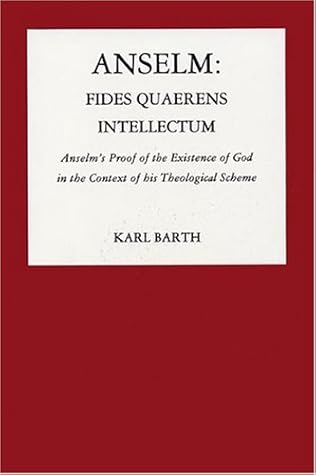- Biblia
- Leer la Biblia
- Versiones de la Biblia
- Verso del dia
- Planes de lectura
- Versos por tema
- Books of the Bible
- Imágenes De La Biblia
- Estudio
- Comentarios
- Concordancias
- Diccionarios bíblicos
- Enciclopedias bíblicas
- Sermones
- Bible Atlas & Maps
- BP Wiki
- Devocionales
- Devocionales de hoy
- Light of the World
- Todos los devocionales
- Inspirational Quotes
- Más
- Picture Quotes
- Videos
- Inspirador
- Estudio Bíblico
- Lo que dice la Biblia
- Bible Q&As
- Daily Bread
- Bible by Genre
- Bible Stories
- Random Bible Verse
- Comunidad
- Store
Anselm, Fides Quaerens Intellectum: Anselm's Proof of the Existence of God in the Context of His Theological Scheme
by Karl Barth
This is one of Barth's most important worksfar more important than may appear at first sight.... Here we have not merely one great theologian taking the measure of another. That in itself would be interesting enough. But in addition to that we are here shown one great theologian clarifying and crystallizing, in conversation with another, his own ideas as to the nature of theology and of the theologian's task.Scottish Journal of Theology
This is one of Barth's most important worksfar more important than may appear at first sight.... Here we have not merely one great theologian taking the measure of another. That in itself would be interesting enough. But in addition to that we are here shown one great theologian clarifying and crystallizing, in conversation with another, his own ideas as to the nature of theology and of the theologian's task.Scottish Journal of TheologyBUY NOW
Paperback, 173 pages
Published August 1st 2004 by Pickwick Publications (first published January 1st 1975)
Suscribir
© 2025 Bibleportal.com Reservados todos los derechos.

Karl Barth was a Swiss Reformed theologian whom critics hold to be among the most important Christian thinkers of the 20th century.
Beginning with his experience as a pastor, he rejected his training in the predominant liberal theology typical of 19th-century Protestantism. Instead he embarked on a new theological path initially called dialectical theology, due to its stress on the paradoxical nature of divine truth (e.g., God's relationship to humanity embodies both grace and judgment). Other critics have referred to Barth as the father of neo-orthodoxy -- a term emphatically rejected by Barth himself. The most accurate description of his work might be "a theology of the Word." Barth's theological thought emphasized the sovereignty of God, particularly through his innovative doctrine of election.
Barth tries to recover the Doctrine of the Trinity in theology from its putative loss in liberalism. His argument follows from the idea that God is the object of God's own self-knowledge, and revelation in the Bible means the self-unveiling to humanity of the God who cannot be discovered by humanity simply through its own efforts.
... Show more